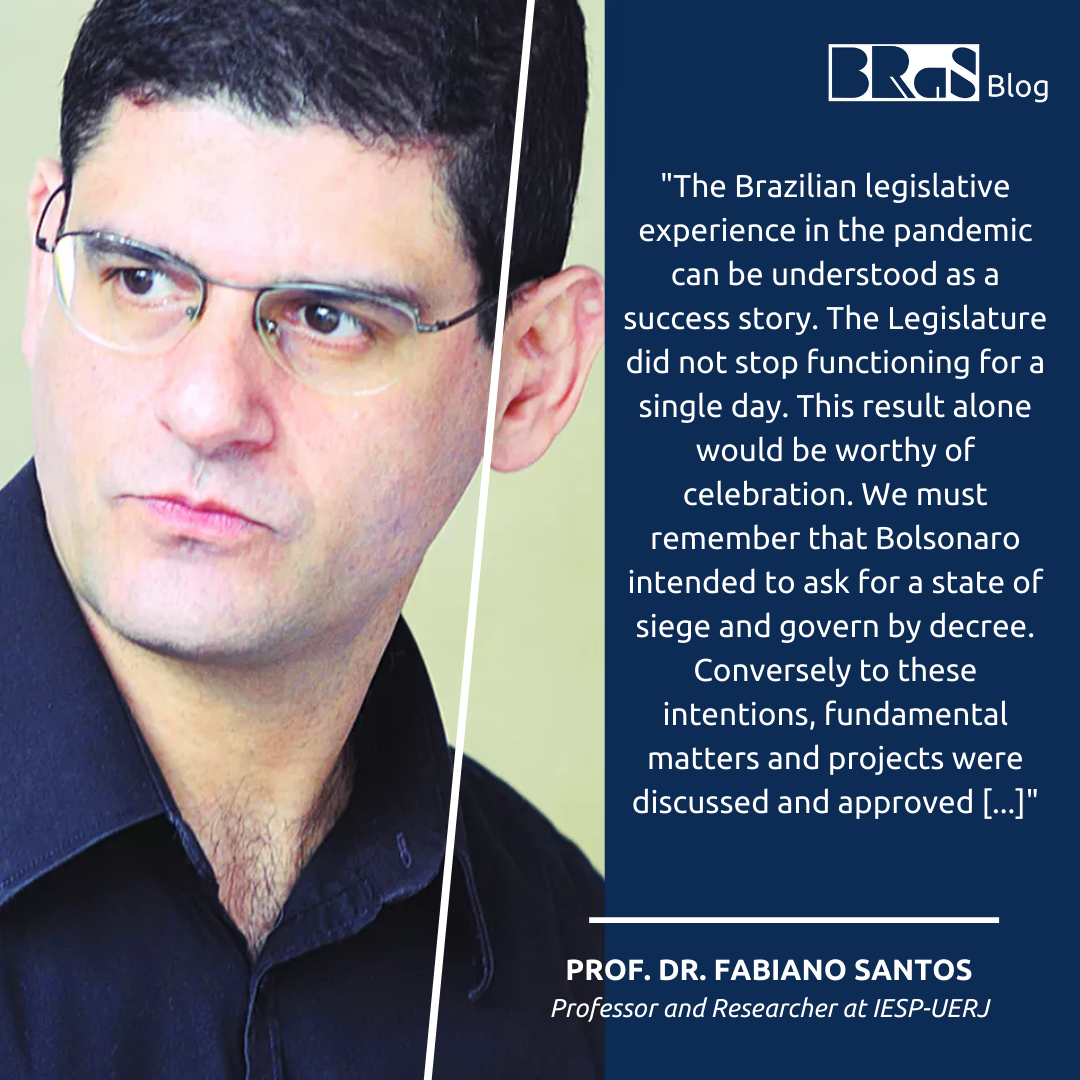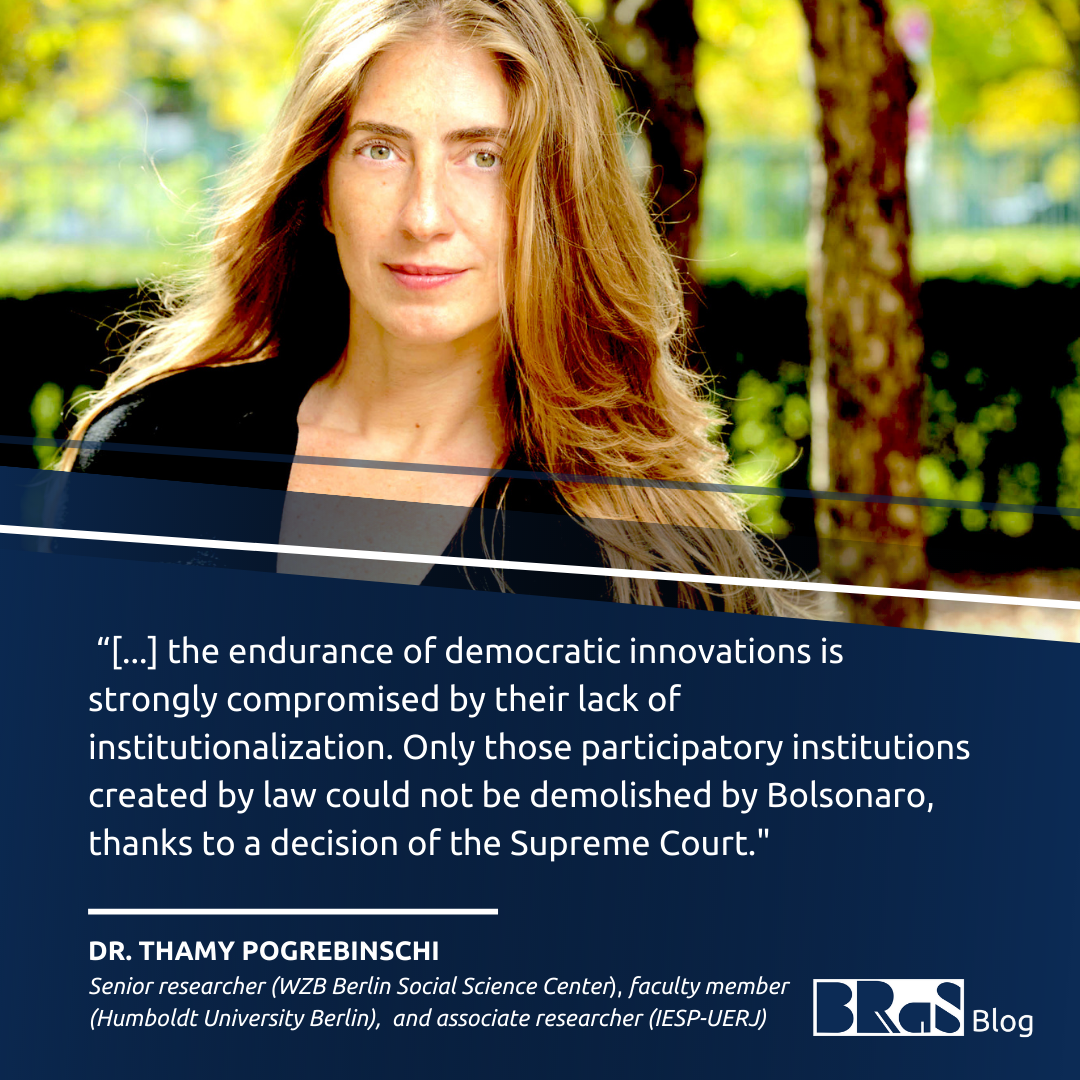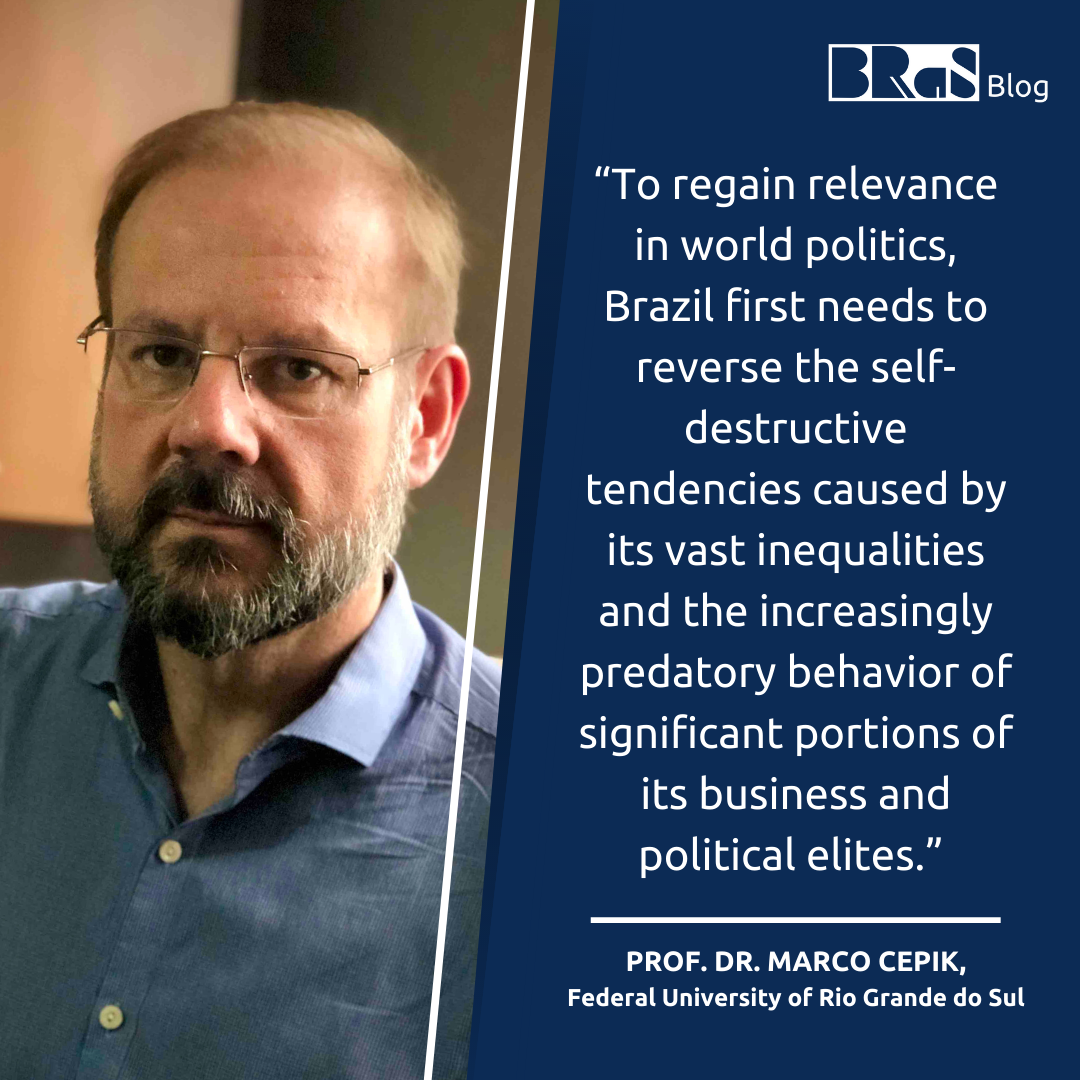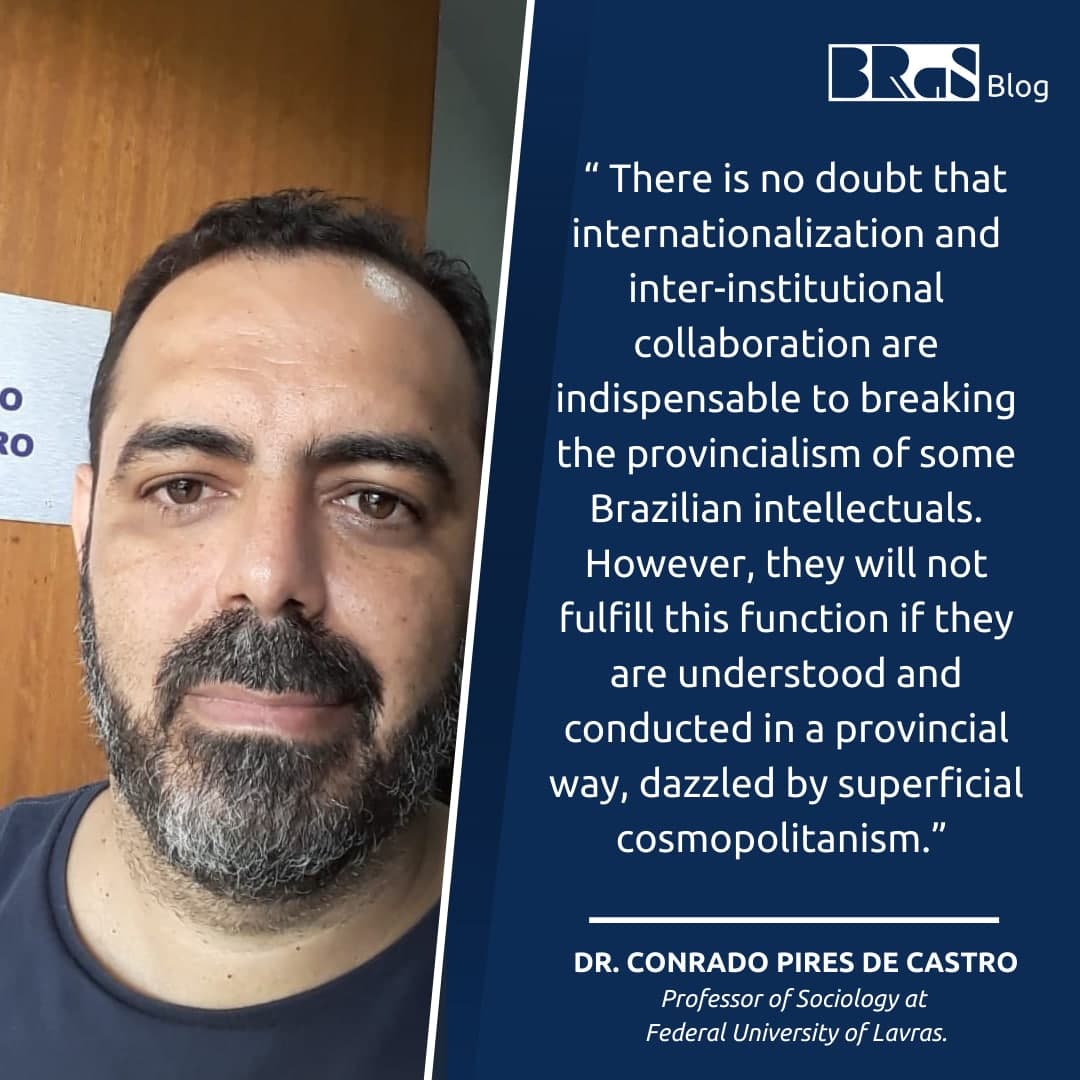Editor’s Note: We are delighted to announce the much-anticipated return of BRaS’ blog’s insightful interview series, featuring renowned experts who will share their perspectives on Brazilian politics, society, and culture. As we continue our commitment to providing our readers with valuable insights and diverse viewpoints, we invite you to actively participate in shaping the conversation. Your input is invaluable, and we encourage you to suggest individuals you believe would contribute significantly to our exploration of the intricate dynamics within the country. Let’s foster a robust, engaging dialogue that enriches our understanding of this multifaceted nation. We are excited to hear your suggestions and the upcoming enlightening talks with some of the foremost experts in the field of social sciences.
—
Interviewee: Professor Davi Rogério de Moura Costa
Interviewer: Matheus Jones Zago
Matheus Zago: We’re starting another round of interviews at Brazilian Research and Studies, and this time, we have the privilege of speaking with Professor Davi Rogério de Moura Costa. Professor Costa is an Associate Professor at the Faculty of Economics, Administration, and Accounting at Ribeirão Preto, USP, and he also coordinates OBSCOOP. Professor Costa, having you here for this interview is a pleasure. We’re thrilled that you accepted our invitation.
On behalf of the editorial team and the Scientific Council of BRaS, we want to express our gratitude for your presence. Welcome.
Thank you! I appreciate the invitation and congratulate BRaS on this initiative. Promoting initiatives like this should be encouraged as they contribute significantly to generating knowledge. Let’s begin.
I would like to know more about your academic journey and how your interest in research on cooperative governance came about.
My journey with cooperatives began during my undergraduate studies in Agronomic Engineering at Escola Superior de Agricultura Luiz de Queiroz (ESALQ), Universidade de São Paulo (USP). During this time, I had the opportunity to attend a course called ‘Cooperative Agribusiness,’ taught by Professor Sigismundo Bialoskorski Neto. Professor Sig, as he is commonly known, later became my advisor during my Master’s studies. At that point, I developed an interest in cooperative management and governance as I had previously carried out internships in agricultural cooperatives during high school while attending an agricultural technical school. The undergraduate course opened up a new path for me, and I started to take more lessons from ESALQ’s Business and Management Department, focusing on business and management. At ESALQ, I completed my final undergraduate internship, where I decided to do my “agronomic residency” at the Organization of Cooperatives of the State of Paraná (OCEPAR). During this time, I researched the economic and financial analysis of agricultural cooperatives in Paraná. It was a valuable experience, and I decided to pursue a master’s degree as I neared graduation.
At the time, the master’s program admission process was highly competitive, and unfortunately, I didn’t get in on my first attempt. So, I began working at the Organization of Cooperatives of the State of São Paulo (OCESP), where I was tasked with developing a cooperative performance analysis program similar to what was done in Paraná. Over the years of working with data and interacting with professionals in the field, I realized that many situations I encountered in my daily work lacked a solid theoretical foundation. This motivated me to seek answers through formal education. After five years of work, I returned to university to pursue my master’s and doctoral degrees.
During my master’s and doctoral studies, my focus in organizational economics was consolidated, emphasizing cooperatives and the governance of agricultural cooperatives. It was a significant period, especially when I had the opportunity to study at the University of Missouri, at the Center for Cooperative Studies, under the guidance of Professor Fábio Chaddad and Professor Mike Cook. My stay there was advantageous and reinforced my conviction that I had chosen the right subject to study. The years 2008 and 2009 were particularly enriching. After my experience abroad, I returned to Brazil and moved to Ribeirão Preto, where I started working with the research group led by Professor Sig, known as the Cooperative Observatory (OBSCOOP). Then, I was privileged to get a professorship at the USP (FEA-RP). Here, I continued to research governance in cooperatives and to work with the Observatory, but now with a new focus. We started calling it “The Cooperative Observatory” and shifted our focus to governance and finance. In summary, my journey began in 1997, and to this day, I have maintained my focus and passion for studying these organizations.
While reading your post-doctoral thesis, I noticed that you categorize control and management in cooperatives. Please explain to our audience what this categorization entails and how management and control apply to cooperatives.
From a governance perspective, there is a relevant debate dating back to 1932, with the seminal work of Berle & Means (1932), which deals with the separation of ownership and control in organizations with dispersed ownership, i.e., those with many owners. This debate has often been brought into the context of cooperatives, where the primary concern is the separation of ownership and control, especially concerning the transaction of property rights, as opposed to corporations.
In the case of cooperatives, this separation is seen as a challenge as it is argued that it can generate more agency costs than benefits arising from the specialization of roles. Some studies address this issue. The debate includes the distinction between being a business owner and specializing in a particular activity while professional managers handle other functions.
During my doctoral studies, while studying cooperatives in the United States, I noticed that in Brazil, many directors of these organizations considered this separation unnecessary. The prevailing logic in Brazil at the time was that the director of the cooperative should also be a member of the cooperative.
This was very different from what happens in other countries, such as the Netherlands and the United States. There, cooperative members sit on the board of directors and delegate authority to professional managers, i.e., contract specialists to act as executives.
In Brazil, cooperative control has been closely linked to the role of the cooperative member on the board. However, this model is changing. Now, some boards of directors are comprised of cooperative members who hire professionals as professional advisors. This is similar to the concept of independent directors. These advisors attend meetings but do not vote.
So, when I decided to work on this topic during my postdoctoral research, the critical question was how the owners of Brazilian cooperatives control the management. The typology used includes diverse forms of ownership and control, leading to different models worldwide.
As the literature developed, it became clear that cooperative members worldwide have different models of controlling cooperative managers. As I delved into my research on Brazil, I identified and classified these models, focusing on the involvement of members in the control process. For example, in Brazil, cooperatives are expected to be found where the members themselves are actively involved in management, holding positions on the board and in the management of the cooperative. However, some cooperatives hire a professional to manage the business. This classification came from studies presenting different realities in New Zealand, the United States, Europe, Brazil, and South America.
I worked with academics such as Professor Fábio Chaddad during my doctoral studies in Missouri and Professor George Hendrikse from Erasmus University Rotterdam, who made significant contributions to this field of study. In my post-doctoral thesis, this typification involved analyzing the different models found in the national context here in Brazil.
Professor Costa, could you give us a brief history of the Observatory of Cooperatives (OBSCOOP) at USP/São Paulo and its leading research and outputs?
The history of the Observatory is relatively brief, beginning in 2007 with the initial proposal by Professor Sigismundo Bialoskorski Neto, our Professor Sig. As I mentioned earlier, I entered the group in 2010, when I became part of the team and later assumed the role of project leader. The Observatory is a research group dedicated to Finance and Governance in cooperative organizations in Brazil. Initially, our focus was on agricultural cooperatives. Still, we decided to expand to include credit cooperatives as well, driven by the availability of data from the fastest-growing system in Brazil and partnerships with the Central Bank and other market players.
It’s important to note that although the theoretical foundations are similar, empirical results vary between the two sectors, leading us to separate our research to highlight specific findings from both sectors.
In the trajectory of the observatory, it’s interesting to highlight two significant milestones. The first was when we realized that our research was about cooperatives rather than cooperation. We broadened our research to encompass agricultural cooperatives and credit unions. This step initiated a research agenda in Organizational Economics applied to cooperatives, generating relevant knowledge about these organizations. Additionally, it has to be mentioned that my personal agenda does not solely drive our research group but also evolves organically with the participation of those involved. This means that, following your example, we now have a variety of topics on our radar, including sociological and political issues related to cooperatives, which were previously absent due to a lack of knowledge in this area. Our group is dynamic, with consolidated knowledge and new contributions constantly emerging.
OBSCOOP has two exciting products: the Individual Cooperative Reports (RICO) and the Cooperative data-sharing platform (Coop-server). The RICO, available on our website, allows users to explore detailed data and performance analyses of credit unions. With it, users can compare the financial indicators of these organizations with others of the same type in different regions, states, Brazil, etc., providing a deeper insight into them. This product has become so valuable that other representation organizations have started offering a similar product with a different purpose.
In the ‘Coop server,‘ we provide data sources and information for other cooperative researchers, such as their bylaws and financial statements. This initiative allows other researchers to access and utilize this data.
In terms of research, our studies have focused extensively on understanding the governance of agricultural and credit cooperatives. Several works, either published or still in the form of working papers, explore, for example, the separation of the decision-making process, incentive mechanisms, control, opportunistic behavior of managers, and entrenched interests in these cooperatives.
A significant achievement for OBSCOOP has been to be awarded the CNPQ SESCOOP tender on Brazilian Cooperatives. Could you tell us about the project’s topic and the group’s leading development objectives?
As previously mentioned, our focus has been on studying cooperatives’ governance structures and mechanisms, with particular attention to the control process exercised by cooperative members. We need to deepen our understanding of why certain cooperatives choose specific arrangements. In contrast, others make different choices even if they are similar in size and number of members.
This is the central question of our research funded by CNPq and Sescoop. We aim to comprehend the motivations behind certain cooperatives or groups of cooperatives opt, for example, for a more professional approach involving external executives unrelated to agricultural production. In contrast, others prefer to have local members actively involved in the day-to-day management of the business.
The research seeks to uncover the motivations behind these choices and examine the implications of these different arrangements. We aim to investigate why co-operatives adopt other governance and management approaches.
Now, what is happening is that the project is coming to us due to a research agenda related to findings made at the observatory some time ago. This knowledge development has been progressing gradually since at least 2012.
Professor, you mentioned the control of cooperative enterprises. Please explain what approach you intend to use to contribute to advancing the knowledge in the area.
The issue of control, particularly the control of managers by cooperative members, goes back to the separation of ownership and control highlighted by Berle and Means (1932). This separation has been the subject of extensive debate in the literature, particularly concerning huge cooperatives with dispersed ownership. Regulatory recommendations have been made, most notably by Fama and Jensen (1983), who argue that the key lies not only in the issue of ownership and control but also in the separation of decision-making processes within organizations, which can increase their likelihood of survival.
In this context of separation, and assuming that different levels of separation entail other mechanisms for cooperative members to control managers, our research seeks to contribute by exploring the determinants that lead to varying levels of separation in the decision-making process within cooperatives. In other words, what mechanisms do cooperative members use to control managers? It is important to note that the aim is not necessarily to link the degree of separation or the mechanisms used to measure organizational performance but to understand why some cooperatives have a higher degree of separation in the decision-making process than others and why their choices are similar or different. Interestingly, this difference is not directly related to performance but to organizational decisions that allow for this variation in the degree of separation. For example, some cooperatives employ a CEO, while others elect a member-producer as the central executive in the assembly.
In credit cooperatives, in particular, it is essential to mention the role of the regulator, as the Central Bank has imposed separation in some instances. For example, in some credit cooperatives, it has been forbidden for members of the board of directors to have a seat on the executive board. This means that the CEO of a credit cooperative is not directly involved in the management but instead in the decision-making process.
In the case of agricultural cooperatives, there is no similar regulatory process, which leads us to different arrangements. Theoretical discussion is focused on why certain cooperatives choose one arrangement over another. This is one hypothesis that we are investigating in this project. The career of the cooperative president, the configuration of the local labor market, and the history of the cooperative play an essential role in explaining the current arrangements. The exciting thing is to refrain from debating the ideal setup and understand why these choices are made. This project’s main contribution is understanding the separation of ownership and control in management.
Could you identify critical authors in this field and also highlight research centers engaged in related studies that may serve as valuable references or potential collaborators for your work?
In terms of the international literature, I highlight the importance of Professor Mike Cook’s work in 1995, which represented a significant paradigm shift by introducing the concept of the life cycle of cooperatives. Mike’s work highlighted the challenges associated with the ownership structure and specific property rights of cooperatives over time.
In addition to Mike Cook, other researchers who worked with him in different parts of the world have also significantly impacted the field. In the United States, for example, I would highlight Professor Fábio Chaddad, who was mentored by Mike Cook and closely worked with him.
Another important figure is Professor Brent Hueth of the University of Wisconsin, whose contributions are highly significant. His leading research at the University of Wisconsin Research Centre is particularly noteworthy. As institution director, he initiated the most important ongoing survey of cooperative governance in the United States, supported by the USDA.
In addition to the University of Wisconsin Research Center, another reference center for cooperative governance in the United States is the center led by Professor Cook in Missouri. There is further research by other scholars, but these two centers remain the primary sources of research and knowledge.
It is also essential to mention Canada, where universities such as the University of Saskatchewan and Hec Montreal have significantly contributed to studying credit unions, particularly in Montreal.
In Europe, four prominent figures made more remarkable contributions to cooperative governance. Professor George Hendrikse at Erasmus University in Rotterdam is recognized for his application of game theory to cooperatives, and his well-structured research extends to various related areas of these organizations. He is known for collaborating with researchers worldwide, including China, Brazil, Iran, and others, forming a global research network on cooperatives. Another outstanding figure in Europe is Jos Bijman of Wageningen University, who, under Hendrikse’s mentorship, has become an essential reference in the governance of agricultural cooperatives.
I would also like to mention Professor Marcus Hanisch from Germany and Professor Constantine Iliopoulos from Greece, who have made significant research contributions. Professor Iliopoulos, mentored by Mike Cook and working closely with Professor Fábio Chaddad, effectively links his knowledge to the practical aspects of cooperatives.
In France, essential research centers like Montpellier are also dedicated to studying cooperatives.
In the Brazilian context, could you please explain why there is such a gap in the knowledge about the topic you mentioned and how it is being addressed in the national literature?
This is a relevant question, especially as it fits into one of the stages of our research project: conducting a systematic literature review focusing specifically on Brazilian academic production. The aim is to understand what has been studied and produced about cooperative governance in Brazil.
In any case, I attribute part of this gap in the national literature to the essentially doctrinal focus given to cooperatives. Historically, Brazilian cooperatives have been promoted to be inherently economically and socially successful organizations, following the Rochdale Principles as if this spared them from other organizations’ theoretical and practical challenges.
Professor Diva Pinho and other significant scholars have extensively propagated the doctrinal context and its treatment. She was one of the pioneers in the study of cooperatives in Brazil. In addition to her, priests Odelso Schneider and Roque Lauchner, both from Unisinos, contributed substantially to cooperative research in Brazil, also with a more doctrinal approach. Their approaches strengthened the understanding of cooperatives as organisations that promoted social well-being and helped to promote the knowledge of cooperativism as a business model that embraces social and community values. However, this perspective only contributes a little to studying the complex issues in economic and social organizations.
Recently, there has been a growing interest in adopting more theoretical approaches to studying the management and governance of cooperatives in Brazil, gradually filling this gap in the national academic literature.
Part of the gap in governance studies in co-operatives can be explained by the need for more systematic theoretical approaches and the fact that early researchers of cooperatives focused on other issues that did not necessarily include the relationship between ownership and control, decision-making processes, or property rights.
I am interested in the methodology and approach you are adopting to investigate control and management in cooperatives.
We have a target sample of 150 cooperatives, 100 in the credit sector and 50 in the agricultural industry. The sample will provide a basis for statistical analysis and exploratory approaches such as multiple case studies. We will study various types of information extracted from the statutes, minutes of meetings, and annual reports of these cooperatives. In addition, their managers will be interviewed.
The information that can be treated statistically, such as the determinants of the separation of decision-making processes, the size of the board of directors, the number of members, the size of assets, and the size of the property, will be analyzed in this way. However, rather qualitative questions, such as why a particular manager chose to delegate more or less or why specific arrangements were chosen in certain locations, will require a multiple-case study approach to analysis.
Our methodology involves a combination of quantitative, statistical, and econometric analysis and a multiple case study approach to address more qualitative and complex issues.
What are the future perspectives and potential contributions of research on the control and management of cooperatives in Brazil for improving the practices and governance of cooperatives in the country?
The critical point in this discussion is our intention to move from an approach solely based on “best practices” towards an evidence-based approach that can lead to improved outcomes. This shift is vital because cooperatives operate under diverse circumstances and arrangements. Therefore, understanding the institutions influencing these arrangements will help us understand their motivations. Our goal is not to merely label something as a universal “best practice.”
We aim to illustrate what might be considered a best practice for one cooperative in a particular region, such as Rio Grande do Sul, characterized by its vast area of operation, engagement in small municipalities, and agricultural production centered on cereals and small producers, may not necessarily be the ideal approach for a cooperative in São Paulo, situated in a different context. This distinction arises due to varying market conditions, intensified competition, and the distinct needs of producers, who may be engaged in various types of agriculture, such as sugarcane or citrus, with varying financial requirements.
In essence, we aim to move beyond a one-size-fits-all best practice and instead provide tailored, evidence-based recommendations to cooperatives, considering their individual characteristics and specific needs. This recognition of diversity underscores the fact that influential determinants of success can differ significantly depending on each cooperative’s unique context and requirements.
As an experienced researcher in the field of cooperatives, what advice or suggestions do you have for those [like me] who are just starting their research journey in this field?
Look, this question is fundamental. For researchers starting to venture into cooperatives, the key is to break the paradigm of doctrine and seek theoretical support for their research. This does not mean completely ignoring (cooperativism) cooperative philosophy, but the researcher’s personal beliefs must not influence the research findings.
I always emphasize this to the people I have worked with and supervised. The key is to look at cooperatives with a practical approach based on theory and less on dogma. Over time, we have often used doctrine as the main starting point for studying them. Still, the real advance in knowledge will come from using a solid theoretical framework to understand better the organizations we study. Doctrine can still be considered, but theoretical underpinning is fundamental. We need to use theories that help us explain the phenomena we observe in the daily life of these organizations.
Alright, Professor, we have come to the end of our interview. It was a delight to hear your research suggestions. I am happy that your project has been approved, and I look forward to your workgroup’s results. Congratulations again! I hope to meet in person in Brazil or, perhaps, in Europe for future meetings and debates.
Thank you for the opportunity. I am happy to answer any other questions that may arise. Thank you, and good luck to everyone.
Zago, Matheus. 2024. "Interview: Prof. Dr. Davi Rogério de Moura Costa". Brazilian Research and Studies Blog. ISSN 2701-4924. Vol. 5 Num. 1. Available at: https://www.bras-center.com/interview-davi-rogerio-de-moura-costa/, accessed on: February 22, 2025.








